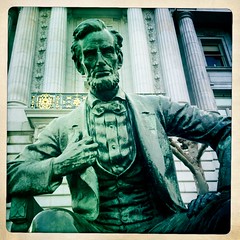 Note: Mild spoilers appear in the final paragraph of this review.
Note: Mild spoilers appear in the final paragraph of this review.When a friend handed me a copy of Abraham Lincoln: Vampire Hunter, I felt a little skeptical. See, I'd read through a sample chapter of Seth Grahame-Smith's Pride and Prejudice and Zombies and hadn't felt the need to press on. The idea of hijacked literature sounded fun on paper, so to speak. But in practice, infusing famous works with schlocky genre tropes just seemed sort of silly. I expected Vampire Hunter to be more of the same.
It pleasantly surprised me to discover that it wasn't.
From the time of grade school, we've all learned about Abraham Lincoln, from his humble backwoods beginnings to his rise to president of the United States to his eventual abolishment of slavery and tragic assassination. Yes, we all know Lincoln -- or do we? What if his internal motivations and meteoric rise to power stemmed from an unknown source? What if that source was an unknown horror, one thought to dwell only in the fevered imaginations of the ignorant and mad? And what if that horror placed Lincoln at the helm of one of the world's most mighty nations for its own purposes? Because that's exactly what Seth Grahame-Smith has discovered: Abraham Lincoln owes it all to the existence of vampires.
I like to imagine that Grahame-Smith started Vampire Hunter on a compositional dare: See if you can take a historical personage and explain everything in his life through an outlandish speculative premise. That's exactly Vampire Hunter's structure, and you know what? It works. We learn how the existence of vampires informs the lost colony of Roanoke Island. (A dying colonist scratched "CRO" on a tree not because of the nearby Croatoan Indians, but because a vampire named Crowley was feasting on the new settlers.) We gain "new" insight into Lincoln's hatred of slavery. (Vampires snatched up old and infirm slaves to drain them dry.) Even the causes of the Civil War get reappraised. (Seems a band of nobler vampires wants to keep a fascist group of their blood-sucking brethren from usurping control of America.) It's great fun to see just what rationale Grahame-Smith will invent next. A couple of continuity errors pop up, though. First, when a trio of vampires starting guarding the oval office, Grahame-Smith goes to great lengths to show their essential affability -- but never bothers to explain how or what they eat. Second, the reinvented Lincoln's struggles with the problem of evil seem to clash with his real-world proclamations about the providence of God, several of which Grahame-Smith includes as chapter headings. An incongruity, sure. But the escapades of this Vampire Hunter still delight.
(Picture: CC 2012 by dbwalker)


2 comments:
Your summary leaves out the one reason I've been hesitant to open this yarn--it reads, allegedly, like a biography and not like a novel. I've kept myself from opening this book because frankly, I spend too much time reading nonfic professionally. I really do like the immediacy of a first- or third-person limited perspective, &c.
But I've heard good things. Very good things. Again, from friends who were very skeptical, and who (like me) found P&P&Z to be the type of joke that outlives its usefulness.
You're right, I didn't mention it. The structure is set up like a biography, but it really doesn't feel like it after the first couple chapters. Honestly, it reads like a thriller -- and a good one, at that.
Post a Comment